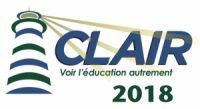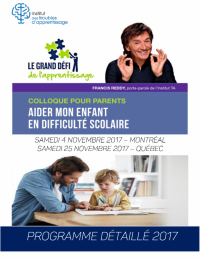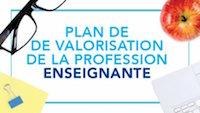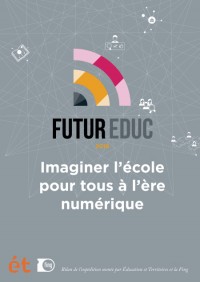Version française sous l’hyperlien plus bas. Thanks to Joseph Denault, Louis Garceau, François Brosseau and Éliane Limbert for this English version. Slides were possible because of the good work of Marie-Hélène Perez and Chantal Bureau.
The Challenge of the Digital Natives
Education is an ongoing daily challenge.
You never know the impact of a word, and it’s impossible to foresee the consequences of a gesture. All educators know that they can’t have an immediate response every time they intervene. During the last twenty years, learning tools went through a dramatic evolution, and social changes marked our families and society as a whole.
Research has influenced the ones who have the role of teaching; I will come back on that later on…
Since Gutenberg, seldom have we seen tools, like the Internet and the new collaborative tools, that have the power to spread Knowledge so efficiently : however, even though those tools definitively are a new landmark for the world of education, it seems that the phenomenon couldn’t justify the term «Education 2.0». Although Social software allowing interaction and supporting Web editing is a great evolution in the ways we learn, that great leap forwards isn’t incompatible with what was already going on in the world of education. The essential is to understand that with what we could call in «Education 2.0», a paradigm shift has reset the meter to zero, meaning that every teacher should now bring forward more open strategies than he had previously used and, most importantly, that he must now focus on what favours learning, rather than to be just centred on his own teaching. »
Teachers, nowadays, ought to consider that they teach to youngsters who are different from before, in their relationship with knowledge. They were born with the presence of technology : the Web, laptops, digital pictures and videos, blogs, emails, chatting, and even Wikis are there since their birth! Therefore, don’t ask those children when those tools came about, because they will look at you, as if you were an Alien. “What a question!” The students actually on the school benches are native of the Internet (Mark Prensky, 2001), whereas their teachers, in the best possible script, are Internet immigrants : therefore, the consequences are important: you can notice an accent when they speak and can also observe a change in their body language and tone.
Any given school teacher, whether in front of a traditional classroom, or whether using distance learning with a cohort, knows very well that people will not learn the same thing at the same time and at the same speed: that is something fundamental, that we discovered from our own experimentation at the St-Joseph Institute, where I started Blogs with Elementary level students. Rapidly, our community members were quite impressed by the efficiency of our Web publication.
In sports or music, a trainer knows that a learner must perform very often in front of an audience, while in development, since the feedback received after performances is a real learning catalyst. Why should it be different when learning to write? Writing in public, is an important component of learning and in that sense, blogs offer a solid incentive to learn. As a consultant, I use Blogs, Wikis and various other social software, such as del.icio.us, Flickr, or You Tube, so as to make learning happen, and I’m always stunned by the results.
Actually, with Opossum, we host more than ten thousand Blogs or Blog’s users, and around thirty Wikis, which favoured learning structures for more than fifty institutional and ministerial projects. Opossum’s cyberportfolios are Blogs organised as electronic portfolios, where we share works, where we think how to develop them and where we identify the resources that we can count on; they are already used by more than thirty schools in Canada and in France. Apart from developing a network culture, those public spaces allow integrated learning, because they create a real working environment for the students. Imagine! Doing his work for the planet instead of narrowing it down to his teacher or his parents. Grand-parents, neighbours, the close community and the greater community are all acting as witnesses, who may also take part into learning, without depriving professional responsibilities from teachers or schools.
However, to make sure those tools produce maximum results, we need to accept that not 100 % of knowledge will transit through teachers: we have to accept the reality that nobody has the monopoly of knowledge. The teachers and the learning community have to accept Web publication as it is, once it’s there: no censuring bottle neck!
The learners can see the results of what they publish immediately and it’s only thereafter, that we can manage the quality of the language with the support of a chart and with a code of ethics that has been socially developed and accepted by the community. It’s the interaction of those different sources of Knowledge, including the teacher’s, that gives a sturdy leverage to the integration of knowledge. And I don’t talk about the old inversion phenomenon: instead of pulling condescending students to learn what I want them to learn, roles are changing, and I actually see them pulling on me to learn, in order to obtain good quality work and in order to create their own Web identity, within their portfolio…
Next January, I will be in Autrans with nine teenagers who have been learning for several years with this type of learning environment. They will witness how Blogs and Wikis have changed their position about Knowledge… I’m really eager to see the eye balls of the immigrants, in the classroom.
To conclude, I would like to thank other «EduBlogers» around the world, with whom I’ve been building for the last five years, and with whom, I still build daily: Stephen Downes, François Guité, Roberto Gauvin, Pierre Lachance, Gilles Jobin, Sébastien Paquet and Alan Levine from Canada. There’s also Clément Laberge, whether I should classify him French or Canadian and Bruno Devauchelle, from France ; moreover, there are Will Richardson, Al Delgado, Anne Davis, Sara Lohnes and Helen Barrett, from the United States, Corine Bourgon and Stéphanie Booth, from Switzerland, Sebastian Fiedler from Germany, David Tosh, from Great-Britain, Margarita Perez-Garcia, from Spain, and Lilia Efimova, from Russia. All of them had great influence on me and I invite you to read their inspiring works…
The students that I influenced as new Blogers have given me a hundred times more than I deserve for my investment in time and research. Beyond the reform of education, the conflicts on teaching skills and how we transmit knowledge, I ask this question: new technologies are lowering down the walls erected around the school system; therefore, shouldn’t the « digital natives » take advantage of that challenge, rather than ignoring those new ways of learning ? Shouldn’t we show students how to use those powerful tools, rather than to let them learn by themselves, without supervision, under the pretext that there are dangers in their use?
Yes, I do know schools that forbid the use of Google, chatting and Blogs! I suppose that they just didn’t yet understand that those tools are today’s pencils and dictionaries.
When our youth will be fed-up with our insignificant attitude, we may then ask ourselves why there is so much violence and apathy in our schools. I therefore call your attention for more judgement, and also, to take side for Education, rather than for control: that’s why I chose to favour the learning of the art of fishing, rather than to just give fish away.
And as we say in French, « c’est en forgeant qu’on devient forgeron », and as you say: « practice makes perfect »
Thank you all for your attention and please, don’t hesitate to call on educators that you’ve met, since sharing is their leitmotiv!
Le défi des natifs de l’Internet
L’éducation est un défi de tous les jours. On ne sait jamais l’effet d’une parole dite, la portée dans le temps d’un geste posé. Tout éducateur sait qu’il ne doit pas attendre une réponse immédiate à chaque fois qu’il intervient. Dans les vingt dernières années, les outils pour favoriser les apprentissages ont évolué au même type que les changements sociaux ont marqué la famille et la société. Les recherches ont aussi influencé ceux qui font apprendre. J’y reviendrai… Depuis Gutenberg, rarement avait-on vu naître un moyen de diffuser de la connaissance aussi percutant. L’arrivée d’Internet et des outils de collaboration marque une étape importante en éducation, mais on ne peut parler à mon avis d’un phénomène justifiant le vocable «2.0». Les logiciels sociaux qui permettent l’interaction et facilitent la publication Web marquent une évolution importante dans les façons d’apprendre, soit, mais ce pas en avant ne me semble pas suffisant pour casser la compatibilité arrière, caractéristique essentielle pour qu’on puisse caractériser ce qui se passe en éducation de 2.0. Je dirais tout au plus qu’un changement de paradigme remet le compteur à zéro, en ce sens que tout enseignant a maintenant le devoir d’ajouter les stratégies plus ouvertes à celles qu’il privilégiait et se centrer sur ce qui fait apprendre plutôt que demeurer centrer sur son enseignement.
L’enseignant d’aujourd’hui doit considérer qu’il fait apprendre à des jeunes qui sont bien différents de lui dans leur rapport au savoir. Ils sont nés avec la présence des nouvelles technologies : le Web, les portables, la numérisation d’images et de vidéos, les blogues, les courriels, le clavardage et même les wikis sont là depuis qu’il est né et ne demandez pas à un enfant depuis combien de temps ces outils existent, il va vous regarder avec des yeux de poisson… Quelle question! Les étudiants sur les bancs d’école sont des natifs de l’Internet (source Mark Prensky, 2001). Les gens qui leur enseignent, dans le meilleur des scénarios sont des immigrants de l’Internet et les conséquences sont importantes : ils ont accent quand ils s’expriment…
Tout bon maître d’école sait que devant lui dans une classe ou en formation à distance avec une cohorte, les gens n’apprendront pas tous les mêmes choses en même temps. C’est en tout cas ce que nous avons avons découvert à l’Institut St-Joseph où j’ai commencé l’utilisation d’une ferme de blogues avec les jeunes élèves du primaire. Rapidement, les membres de notre communauté ont été impressionnés par l’efficacité de la publication Web. Dans les sports et la musique, un formateur sait qu’il doit faire en sorte que l’apprenant puisse se produire en public souvent pendant son cheminement. Les nombreux feedbacks qu’il reçoit à ce moment agissent comme de véritables catalyseurs d’apprentissage. Pourquoi en serait-il autrement quand il s’agit d’apprendre l’écriture? Écrire en public est une composante importante de l’apprentissage et les blogues sont de puissants leviers pour faire apprendre, dans ce sens. À titre de consultant, j’utilise les blogues, les wikis et plusieurs logiciels sociaux (tels del.icio.us, Flick, You Tube, etc.) pour faire apprendre et je suis stupéfait des résultats récoltés. Actuellement chez Opossum, nous hébergeons plus de dix milles blogues ou blogueurs, une trentaine de wikis qui sont favorisent la construction d’apprentissage dans plus d’une cinquantaine de projets institutionnels et ministériels. À eux seuls, les cyberportfolios d’Opossum (des blogues aménagés en portfolios électroniques où on partage ses travaux, où on réfléchis à comment on les a construits et où on nomme les ressources sur lesquelles on peut compter) sont utilisés par plus de 30 écoles au Canada et en France. En plus de développer la culture de réseau, ces espaces publics permettent des apprentissages intégrés, ne serait-ce parce qu’ils permettent un vrai contexte de travail pour les étudiants. Imaginez : faire son travail pour la planète au lieu de le restreindre à son enseignant et à ses parents. Les grands-parents, les voisins, la communauté rapprochée et celle plus élargie agissent comme rétroacteurs et participent aux apprentissages des jeunes sans rien enlever aux enseignants ou à l’école.
Mais pour que ces outils procurent le maximum de résultats, il faut accepter que 100% du savoir ne transitent pas par l’enseignant. Il faut accepter la posture de celui qui n’a pas le monopole des connaissances. L’enseignant et la communauté éducative doivent aussi accepter le principe de la gestion a posteriori de la publication Web; pas de goulot d’étranglement, les apprenants voient immédiatement le résultat de ce qu’ils publient et on gère la température avec l’aide de charte d’utilisation d’une langue de qualité et d’un code de déontologie socialement construit et accepté… C’est l’interaction avec les différentes sources de savoirs (dont l’enseignant) qui procurent le levier si puissant pour intégrer les connaissances. Et je ne parle pas du phénomène d’inversion de la tendance d’autrefois. Au lieu de tirer après les étudiants pour qu’ils daignent considérer ce que je veux leur faire apprendre comme enseignant, c’est eux qui «tirent» après moi pour apprendre ce qui leur est nécessaire pour obtenir un travail de qualité et être à la hauteur de l’identité Web qu’il se donne par leur portfolio…
En janvier, je serai à Autrans avec neuf étudiants de 12 à 14 ans qui apprennent depuis quelques années au contact d’environnement de ce type. Ils témoigneront de ce que l’utilisation des blogues et des wikis changent leur rapport au savoir… j’ai bien hâte de voir les yeux des immigrants dans la salle!
En terminant je veux dire merci aux autres «Edublogger» à travers le monde avec qui j’ai construit depuis cinq ans et avec qui je continue de construire au quotidien. Stephen Downes, François Guité, Roberto Gauvin, Pierre Lachance, Gilles Jobin, Sébastien Paquet and Alan Levine du Canada. Il y a aussi Clément Laberge, dont je ne sais plus si je dois dire qu’il est Français ou Québécois et Bruno Devauchelle, de la France ; également, il y a Will Richardson, Al Delgado, Anne Davis, Sara Lohnes and Helen Barrett, des États-Unis, Corine Bourgon et Stéphanie Booth, de la Suisse, Sebastian Fiedler d’Allemagne, David Tosh, de Grande-Bretagne, Margarita Perez-Garcia, d’Espagne et Lilia Efimova de Russie m’ont beaucoup influencé et je vous invite à les lire…
Les étudiants que j’ai fait bloguer me rendent au centuple les heures que j’ai investies dans ma pratique et dans mes recherches pour faire apprendre. Au-delà des réformes en éducation et des conflits sur la pédagogie et la manière de transmettre des connaissances, je pose la question : «Les nouvelles technologies abaissent les murs érigés dans l’école; pourquoi ne pas en profiter pour relever le défi de la signifiance envers les natifs du numérique plutôt que de faire comme si ces moyens d’apprendre et d’échanger n’existaient pas? Doit-on faire apprendre comment utiliser un outil puissant sous supervision ou laisser les jeunes les découvrir et les apprendre seuls, sans supervision sous prétexte qu’il y a aussi des dangers reliés à leur utilisation? Je connais des écoles qui interdissent l’utilisation de Google, du clavardage et des blogues; j’imagine qu’ils ne comprennent pas encore que ces outils sont les crayons et les dictionnaires d’aujourd’hui. Quand les jeunes en auront assez de nos insignifiances, on se demandera pourquoi il y a autant de violence et d’apathie dans les écoles. J’appelle à un peu plus de discernement… Je choisis l’éducation plutôt que le contrôle. Je choisis de faire apprendre à pêcher plutôt que de gaver de poissons. Merci de votre attention et n’hésitez pas à interpeller les éducateurs que vous rencontrerez!





Hello Mario,
Congratulations for your presentation during the event Le Web 3. I really enjoyed your insight and welcome your involvement in 2 of our blogs dealing with corporate blogging:
The intranet manager blog http://b-r-ent.com
The new era of marketing http://nano-marketing.viabloga.com
I hope that we can join forces in getting the word 2.0 spread out !
Gilbert
The guy who asked you the question !
Hello Mario,
Bravo pour votre présentation pendant Le Web 3. J’ai beaucoup apprécié votre analyse sur l’impact du web 2.0 dans la formation et nous serions très heureux d’échanger avec vous dans le cadre de nos 2 blogs sur le phénomène du blog dans l’entreprise et l’organisation au sens large du terme:
Le blog des managers intranet http://b-r-ent.com
La nouvelle ère du marketing http://nano-marketing.viabloga.com
Au plaisir de joindre nos efforts pour sensibiliser les efforts entrepris des 2 côtés de l’Atlantique !
Gilbert
Le bloggeur qui vous a posé la question lors de la conférence.
Thanks / Merci Mario! Found this by a trackback to my blog, though I must let you know I am not from Canada, unless you consider Arizona a distance southern province 😉
You have some wonderful success stories with students you have reached, keep up the wonderful work.
Comme Technorati semble avoir un peu de mal…
Comme ton anglais s’est amélioré, Mario. Tu devrais aller à Paris plus souvent 😉
Mon passage préféré: « However, to make sure those tools produce maximum results, we need to accept that not 100 % of knowledge will transit through teachers: we have to accept the reality that nobody has the monopoly of knowledge. »